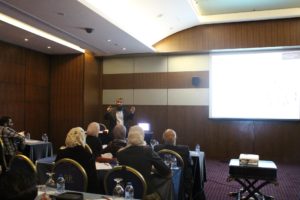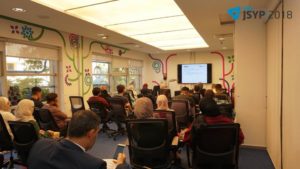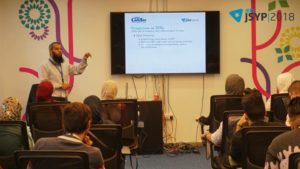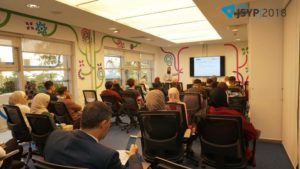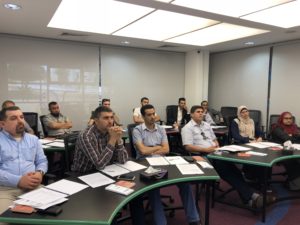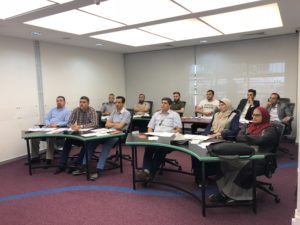YP Event: Towards the Next-Generation Communication Systems
Location: MENACOMM 2022
Date: 7 December 2022
Abstract:
As technology is advancing, applications are becoming diverse and demanding with the rise of global trends. New innovative services are unfolding; many of which are extremely sensitive to delay and yet require extensive computational and radio resources. Moreover, the explosive growth in the number of mobile devices and diverse wireless services, such as virtual/augmented reality and Internet-of-everything, are overloading existing networks. To meet these unprecedented tremendous traffic demands, the research community is currently actively involved in the design of the key components that will lead to the development of next-generation communication systems with the ability to accommodate heterogeneous data traffic, massive connections, and high loads with ultra-fast speeds. This presentation discusses the evolution of wireless communication systems and emerging technologies while highlighting the new application trends, as well as the main challenges faced in existing wireless systems. The vision towards the next generation of communication systems and the main key components involved in shaping future technologies and services will be explored in the most recent research areas in communications.
Speakers’ Bio:
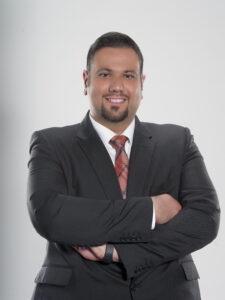 Dr. Ali Alfayly is an assistant professor at the computer department in College of basic education, Kuwait. He acts as Kuwait IEEE section treasurer. Also, he is member of IEEE Region 8 Young Professionals Committee and member of congress coordination team. Dr Alfayly was vice-chair of IEEE GCC SYP 2019. , He received B.Sc. and M.Sc. in Computer and Network Technology from Northumbria University, UK in 2005 and 2006 respectively, Postgraduate Diploma in Internet and Distributed System from Durham University, UK in 2008, M.Sc. in Advance Computer Science from Manchester University, UK in 2011, and Ph.D. in Computing and Comm. from University. His research interests include mobile computing, IoT, E-learning ,AI applications and QoE.
Dr. Ali Alfayly is an assistant professor at the computer department in College of basic education, Kuwait. He acts as Kuwait IEEE section treasurer. Also, he is member of IEEE Region 8 Young Professionals Committee and member of congress coordination team. Dr Alfayly was vice-chair of IEEE GCC SYP 2019. , He received B.Sc. and M.Sc. in Computer and Network Technology from Northumbria University, UK in 2005 and 2006 respectively, Postgraduate Diploma in Internet and Distributed System from Durham University, UK in 2008, M.Sc. in Advance Computer Science from Manchester University, UK in 2011, and Ph.D. in Computing and Comm. from University. His research interests include mobile computing, IoT, E-learning ,AI applications and QoE.
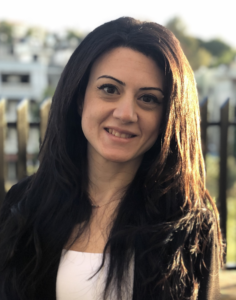 Dr. Nadine Abbas is an Assistant Professor in the Computer Science and Mathematics department at the Lebanese American University (LAU). She earned a BE degree in Computer and Communication Engineering from Notre Dame University (NDU) in 2008. She received her M.E. and Ph.D. degrees in Electrical and Computer Engineering from the American University of Beirut (AUB) in 2011 and 2017, respectively. Dr. Abbas has received several awards including a visiting researcher position in 2012 at Intel Corporation USA, in addition to a scholarship from the Lebanese National Council for Scientific Research 2015-2017, and NDU’s Engineering Research Innovation Award in 2008. She currently serves as the Membership Development officer (MD) of the IEEE Lebanon Section, the Vice Chair of the IEEE WIE Lebanon, and the Technical Manager at Beirut AI. Her research interests include mobile edge computing and wireless communications. The aim is to provide novel solutions that address emerging challenges in the design of next-generation heterogeneous wireless networks, including ultra-reliable and low-latency communication systems in the context of 5G/6G mobile communications, tactile internet, internet of things, and cognitive vehicular-to-everything networks.
Dr. Nadine Abbas is an Assistant Professor in the Computer Science and Mathematics department at the Lebanese American University (LAU). She earned a BE degree in Computer and Communication Engineering from Notre Dame University (NDU) in 2008. She received her M.E. and Ph.D. degrees in Electrical and Computer Engineering from the American University of Beirut (AUB) in 2011 and 2017, respectively. Dr. Abbas has received several awards including a visiting researcher position in 2012 at Intel Corporation USA, in addition to a scholarship from the Lebanese National Council for Scientific Research 2015-2017, and NDU’s Engineering Research Innovation Award in 2008. She currently serves as the Membership Development officer (MD) of the IEEE Lebanon Section, the Vice Chair of the IEEE WIE Lebanon, and the Technical Manager at Beirut AI. Her research interests include mobile edge computing and wireless communications. The aim is to provide novel solutions that address emerging challenges in the design of next-generation heterogeneous wireless networks, including ultra-reliable and low-latency communication systems in the context of 5G/6G mobile communications, tactile internet, internet of things, and cognitive vehicular-to-everything networks.
5G Future Networks: Coexistence or Contradiction
Location: JEEIT 2019 Conference
Date: 17 April 2019
Abstract:
The chapter chair, Dr. Aldalahmeh, has given a workshop on 5G technology in the JEEIT 2019 conference. The talk shed light on the pillars of 5G technology and the possibility of coexistence with current mobile and fixed broadband technologies.
Speaker:
 Sami Ahmed Aldalahmeh received his PhD degree from University of Leeds, UK, in 2013, in which he obtained funding from Leeds University and the US Army Research Lab. He was awarded his MSc degree in Communications Signal Processing from King’s College London, UK, in 2007 with distinction and top of his class. He earned his BSc degree in Electrical Engineering from the University of Jordan, Jordan, in 2006. Currently he is an associate professor in the Engineering and Technology Faculty at Al-Zaytoonah University of Jordan since 2013. His research interests include distributed detection and estimation, wireless sensor networks, stochastic geometry models for wireless networks, delay and throughput in wireless sensor networks, and sensor signal processing. Dr. Aldalahmeh currently is the chair of the IEEE Joint Communication and Signal Processing Society chapter in the Jordan section. He also served as its secretary before. He is a senior IEEE member and an active IEEE member for 15 years with affiliation is the IEEE signal processing and communication societies. He has established the first IEEE signal processing chapter in Jordan as a joint chapter, in addition to helping in establishing several IEEE communication and signal processing student chapters.
Sami Ahmed Aldalahmeh received his PhD degree from University of Leeds, UK, in 2013, in which he obtained funding from Leeds University and the US Army Research Lab. He was awarded his MSc degree in Communications Signal Processing from King’s College London, UK, in 2007 with distinction and top of his class. He earned his BSc degree in Electrical Engineering from the University of Jordan, Jordan, in 2006. Currently he is an associate professor in the Engineering and Technology Faculty at Al-Zaytoonah University of Jordan since 2013. His research interests include distributed detection and estimation, wireless sensor networks, stochastic geometry models for wireless networks, delay and throughput in wireless sensor networks, and sensor signal processing. Dr. Aldalahmeh currently is the chair of the IEEE Joint Communication and Signal Processing Society chapter in the Jordan section. He also served as its secretary before. He is a senior IEEE member and an active IEEE member for 15 years with affiliation is the IEEE signal processing and communication societies. He has established the first IEEE signal processing chapter in Jordan as a joint chapter, in addition to helping in establishing several IEEE communication and signal processing student chapters.
The Path to Innovation: A Story Collection by a Grey-Haired Dude
Location: University of Jordan
Date: 1 Aug 2019
Abstract:
The word “Innovation” may not be very well understood by many and more often is mistakenly mixed up with the word “Invention”. In this prominent IEEE Distinguished Lecture event, one would stop and ask “what is innovation? How is it measured, managed and nourished? What elements that lead to an innovative work? Is Innovation a God given gift or it can be acquired? Though the answers to these questions are subjective in nature, the statistics of successful, and what people have labeled as “innovative” work can provide some credible answers. Instead of presenting a highly technical talk about circuits only very few can follow with equations and plots that maybe forgotten, the speaker decided to walk the audience through different elements leading to an innovative work based on a collection of some real life stories over a twenty-year span career. The talk should appeal to various disciplines and audience within IEEE as well as to various students of all academic levels.
Speaker:
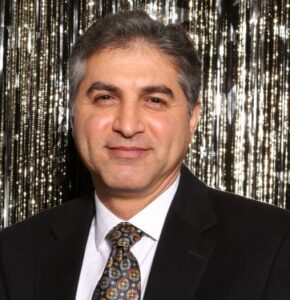

Software Defined Radios:
Road to 5G Seminar Sept 2018
Date: 15 Sep 2018
Abstract:
This workshop was organized as an event in the IEEE Jordan Student and Young Professional Congress (JSYP) 2018.
This workshop introduces the intriguing field of software defined radios (SDRs). SDR has been around for more than twenty years hidden in our phones, laptops and tablets powering our smart digital lives. You will get to know how SDRs are paving the way for research and innovation for the 5G revolution, by providing an efficient hardware-in-a-loop paradigm that accelerate the research span and shortens the time –to-market. Moreover, we will go over how SDRs became integrated in several education programs. Finally, you will witness the SDR in action by trying out several live examples using MATLAB and RTL-SDR.
Outline:
- 20 Years of Software Defined Radios (SDR).
- SDR Innovation in 5G Research.
- SDR Revolution in Education.
- SDR Real-time Examples using MATLAB and RTL-SDR.
Speaker:



Wireless for IoT Workshop
Location: Hussain Business Park
Date: 14 July 2018
Abstract:
The ComSoc provided this IEEE ComSoc certified offline training on the wireless aspect of the internet-of-things (IoT). We had 13 participants, 5 of which were non-members that joined us after the workshop. The participants received an official IEEE certificate of their attendance.


